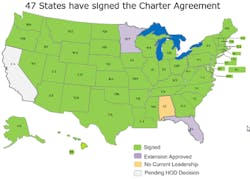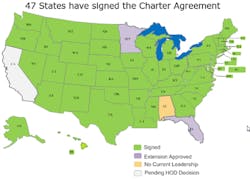ADHA town hall counters CDHA claims about charter agreements between dental hygiene associations
RDH magazine editor Mark Hartley interviews ADHA president Jill Rethman about the charter agreements with state dental hygiene associations.
The American Dental Hygienists’ Association (ADHA) sharply responded to a fact sheet distributed by the California Dental Hygienists’ Association (CDHA) via Facebook during a online town hall meeting about charter agreements between the ADHA and state associations.
The national association hosted two town hall meetings on May 24. The ADHA reported afterwards that 90 people listened to the first hour-long discussion, which included fielding questions from participants. The first town hall occurred during the lunch hour in California, while the second event was scheduled during the early evening.
Jill Rethman, RDH, the current ADHA president, provided all of the national association’s commentary with the exception of a brief explanation about charter agreements by the ADHA’s legal counsel, Kimberly Pendo.
Rethman started out by discussing charter agreements in general, citing the ADHA’s objective to achieve “needed changes” to ensure “best business practices” and “uniformity across the country.” She explained why the charter agreements are designed to “protect the volunteer leaders in dental hygiene.”
ADHA shared the above map during the town hall.
Rethman briefly referred to granted extensions in Minnesota and Florida regarding charter agreements with those states, where the ADHA is reviewing “policy and procedures guidelines.” Without question, though, the ADHA wanted to clearly refute claims made by the CDHA in its fact sheet posted on Facebook on May 11. (The ADHA also released a fact sheet in late May that can view viewed here.)
In particular, the CDHA claimed that the ADHA charter agreement would “harm” the state association and constituent societies.
“What possible benefit would that (harming the CDHA) be to the ADHA?” Rethman asked the town hall audience.
The ADHA town hall was prompted by an indication by the CDHA’s executive board that it would seek termination of its relationship with the ADHA during its house of delegates meeting in Fresno on June 3-5.
Other comments about the CDHA fact sheet focused on:
- The CDHA claimed that the ADHA “flatly rejected” working with the state on terms of the charter agreement. Rethman replied that the ADHA desired “uniform” agreements that applied to all states, streamlining the national association’s advocacy efforts with state efforts. She said dental hygiene associations in Minnesota and Florida participate that “multi-state work groups” to iron out concerns about the charter agreement. She said the CDHA is invited to participate, if the state’s leadership wished to do so.
- Rethman elaborated on the “timeline of communications” with the CDHA, saying Ann Battrell, the ADHA’s executive director, participated in a conference call with CDHA officials in January about questions regarding the charter agreement. She also said the ADHA granted a request from the CDHA for an extension in February to sign the charter agreement, offering a May 1 deadline. The CDHA board, however decided to terminate the agreement on March 18.
- The CDHA claimed all assets and records would be “surrendered” to the ADHA, if either association “revoked” a charter agreement. Rethman pointed out that the stipulation is actually required by California law, and that it has been a part of ADHA’s bylaws since 2009.
- The CDHA claimed the “onerous” charter agreement is a “one-size-fits-all” agreement that does not account for variations in state laws. Rethman denied that the charter agreement is in conflict with California law, and also clarified that the ADHA does not “govern” member associations according to Illinois laws (the national association’s headquarters is in Illinois).
- The CDHA said the “ADHA has not demonstrated any ability to provide … leadership in our state.” Rethman provided a long list of what the ADHA claims demonstrates an effective partnership with the CDHA. The list can be viewed here.
- Although it was not a part of the CDHA fact sheet, the ADHA also claimed it requested a meeting with the CDHA board before it voted to terminate the agreement in March, but “no response was received” regarding how the state association would handle a “group tax filing” requirement. The ADHA said “CDHA [was] unwilling to have any further discussions with ADHA.”
Afterwards, the CDHA declined to comment on the ADHA town hall forum. Lory Laughter, RDH, who is a CDHA trustee, commented on the town hall forum with an independent viewpoint from her colleagues on the CDHA board (Laughter also writes a column for RDH magazine, which is owned by PennWell Corp.).
"To me, the town hall meeting was more of an opportunity for ADHA to say they are right and CDHA is confused," Laughter said. "Jill admitted on the call that ADHA will not negotiate the terms of the charter agreement, yet highlighted ADHA's attempts at communication. That is a very limited and one-sided approach to communication. Why keep reaching out if you won't discuss a way to fix the problems?"
Laughter continued, "The fact remains, the charter, as written, is not beneficial to CDHA members. It would be costly and unnecessary as CDHA is already in compliance with California nonprofit corporate laws and in compliance with 990 tax laws. There needs to be negotiation, not merely continued attempts to talk CDHA into line with ADHA demands."
Dental hygienists can listen to a replay of the town hall meeting by clicking here.
Other key points made by the ADHA included:
- The current proposed charter agreements with state associations were a long process started by the national association more than 10 years ago after federal regulations overhauled the requirements for nonprofit associations. In 2013, the ADHA’s trustees began discussing the framework of charter agreements. After many meetings and workshops over a two-year period, the ADHA adopted the final charter agreements in March 2015, distributing the information to state associations by October 2015. “ADHA’s goal is to insure [sic] its members leaders and volunteers receive the highest level of support and protection,” Rethman said.
- Much of the publicized concerns about the charter agreements in recent weeks focused on fiduciary burdens on constituent societies. Rethman provided a table during the town hall, illustrating how to total costs for an incorporated component in California would be less than $800.
- Rethman also discussed the aftermath of a CDHA house of delegates decision to confirm its board’s decision to terminate the agreement. She said current CDHA members would remain members of the ADHA and would work with those members to create a “new California constituent” to protect those members from being “unrepresented” or “disenfranchised.”
Rethman said, “We (ADHA) do not want this to happen” about the upcoming vote in Fresno to end the relationship between the two associations. She encouraged California dental hygienists to contact CDHA delegates to discuss the upcoming house of delegates meeting. She said dental hygienists could directly ask the ADHA questions at [email protected].
For the most current dental headlines, click here.
About the Author

Mark Hartley
Mark Hartley is the editor of RDH magazine and collaborates with Kristine Hodsdon on many of the articles for RDH eVillage, which also appear on DentistryIQ.com.

